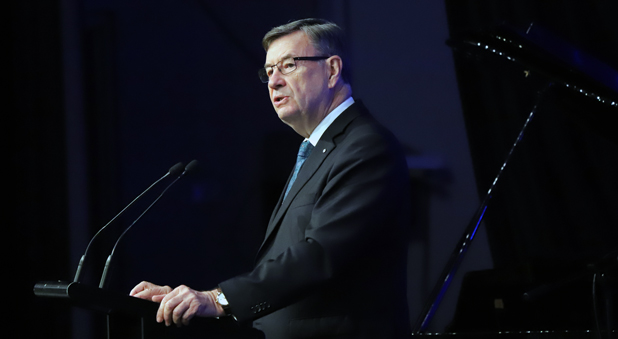Archbishop Glenn Davies has spoken of the challenges to Christian faith within the Anglican Church in his final Presidential Address to the 2019 Synod of the Diocese of Sydney.
Taking his inspiration from the Pastoral Epistles, which he said had been a regular source of comfort throughout his ministry, Dr Davies said "The first priority of the Archbishop of Sydney is to be a guardian of ‘the faith that was once for all delivered to the saints’ (Jude 3). This is true of all those who hold office as a bishop in the church of God." Dr Davies spoke on the first day of the Synod which will run for five days, gathering ministers and lay representatives from across the Diocese of Sydney.
While congratulating the bishop-elect of Bathurst Mark Calder, Dr Davies spoke of the consecration of Jay Behan who will lead the newly-created Church of Confessing Anglicans of Aotearoa New Zealand. Mr Behan spoke to the Synod shortly before the Presidential Address. "We heard this afternoon of the sorry tale of the departure of the Anglican Church in Aotearoa, New Zealand and Polynesia from the teaching of Scripture, when their General Synod passed legislation last year, authorising bishops to allow the blessing of same-sex unions in their dioceses. If one knows the recent history of the Anglican Church across the Tasman, then this outcome was no great surprise. For years the province has not only tolerated, but also affirmed, senior clergy living in same-sex unions or marriages. It was sadly inevitable that they would choose to proceed to legitimise the blessing of same-sex unions, in contravention of Resolution I.10 of the 1998 Lambeth Conference, as it will be inevitable that over time the solemnisation of same–sex marriages using Anglican rites will also become acceptable in New Zealand, as it has in North America." the Archbishop said.
Dr Davies said he and more than a dozen other Bishops and senior Anglicans from Sydney will attend the consecration in Christchurch this Saturday. "The Confessing Anglicans of Aotearoa New Zealand have no remaining property to call their own. Their members have walked away from their church buildings, and their clergy have foregone their residences and security of tenure, leaving behind the infrastructure that the established Anglican Church has accumulated since the days of Samuel Marsden. Yet I venture to say that the Reverend Samuel Marsden would not recognise the Anglican Church of Aotearoa, New Zealand and Polynesia of today as being the same church that he founded two hundred years ago. Jay Behan and his fellow clergy are now the true heirs of Samuel Marsden’s heritage – his theology and his faith. It is therefore our privilege and delight to offer Bishop-elect Behan the right hand of fellowship this afternoon and to recognise him and his diocese as authentically Anglican." Dr Davies said to the applause of the Synod.
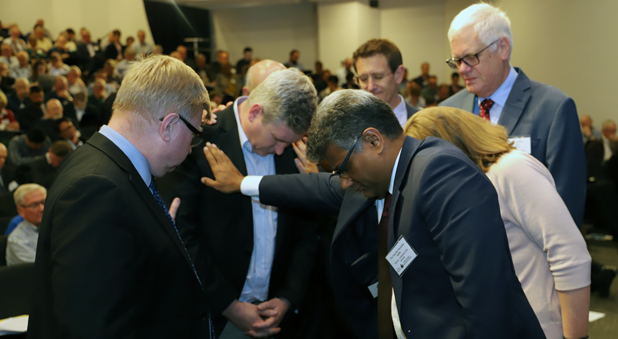
Treacherous waters
The Archbishop also referred to moves in the Diocese of Wangaratta, as well as in Newcastle, to offer services of blessing to same-sex couples. The Primate has referred these attempts to the body known as the Appellate Tribunal, which rules of matters of church law. Dr Davies called the endorsement of same-sex marriage a 'serious breach of fellowship' and against teaching of Scripture and the doctrine of Christ. "Yet our view of marriage is not a popular one in Australia, nor is it consistent with the definition of marriage under the amended Marriage Act 1961, after 60% of the population endorsed, by postal vote, a change to the Marriage Act, which would permit same-sex marriages. Nonetheless, God’s intention for marriage has not changed. We honour him when we abide by his instruction. We cannot bless same-sex marriages for the simple reason that we cannot bless sin. I am grateful for the Primate’s intervention by referring the decisions of the Wangaratta Synod to the Appellate Tribunal. He also requested that no clergy in the Wangaratta Diocese use the new service until a decision had been reached ..." the Archbishop said. "Friends, we have entered treacherous waters. I fear for the stability of the Anglican Church of Australia. These developments have the potential to fracture our fellowship and impair our communion. I have stated this on numerous occasions at the annual National Bishops’ Conference, but sadly to little effect. Next year the General Synod will meet in a special session to confer on the issue of same-sex blessings and same-sex marriage. It has been planned by the General Synod Standing Committee as a consultation, with no opportunity for making decisions. However, the time has come to take action and make decisions, and these recent events have made it all the more imperative to do so. The General Synod must make a clear statement about the teaching of the Bible on the sanctity of sex within the marriage bond of a man and a woman, so that marriage is held in honour among all and the marriage bed is not defiled (Hebrews 13:4). My own view is that if people wish to change the doctrine of our Church, they should start a new church or join a church more aligned to their views – but do not ruin the Anglican Church by abandoning the plain teaching of Scripture. Please leave us. We have far too much work to do in evangelising Australia to be distracted by the constant pressure to change our doctrine in order to satisfy the lusts and pleasures of the world."
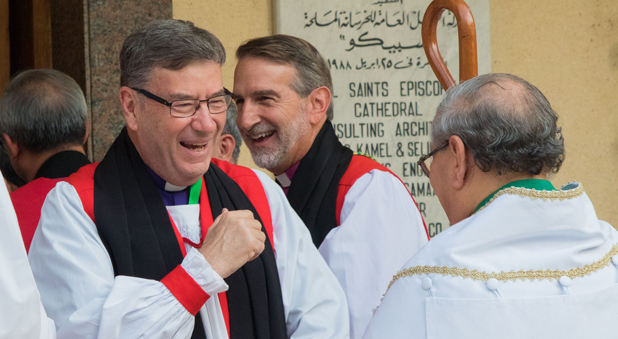
Mission progress
The Archbishop devoted the middle portion of his address to the Diocesan Mission, Mission 2020, which he said would be extended to allow time for a new Archbishop to settle in and develop mission plans. "Our vision is to see Christ honoured as Lord and Saviour in every community. We adopted this vision five years ago and it has been a helpful reminder of the Lordship of Jesus Christ and his unchanging commission to make disciples of all nations. We also adopted a Mission statement, referred to as Mission 2020.
We commit ourselves afresh, in prayerful dependence on the Holy Spirit, to glorify God and love our neighbour by proclaiming the Lord Jesus Christ, calling people to repent and living lives worthy of him. Bishop Lin will provide an update on the progress of Mission 2020 during this session. While one might have assumed that Mission 2020 will conclude next year, the Strategy and Research Group has recommended to Standing Committee that we continue using the vision, mission, values and priorities of Mission 2020 for the foreseeable future. While the mission of the Diocese is never the personal fiefdom of the Archbishop, the opportunity for the next Archbishop to provide leadership in any suggested changes to Mission 2020, in consultation with the Strategy and Research Group, is a sensible way forward."
Dr Davies said that some mission goals have been achieved, others have not been reached, and some may have been 'more aspirational than realistic'. "The projected number of 15 new churches in greenfield areas or the expectation that we would have two new churches in each Mission Area by 2020 have fallen short." he said. "Yet, we have made progress in establishing new churches in greenfield areas and seen new churches planted in Mission Areas. I believe that we have a heart for mission across the Diocese. The Synod’s reaffirmation, for example, of agreeing to a land levy of 2% of each parish’s net receipts has been a wonderful illustration of sacrifice for the sake of the kingdom. I am also delighted to see the ongoing work of New Churches for New Communities (NCNC), who have raised 4.6 million dollars over the past four years, plus a further $300,000 in pledges. The commitment of many parishes and individuals to donate funds through NCNC for the provision of buildings on the land purchased by the Mission Property Committee, has enabled the current construction of Stanhope Anglican Church and in a few months the construction of a larger building for Hope Anglican Church at Leppington. These buildings will only enhance the tireless efforts of the respective church planters and their congregations to be bearers of light and grace to the new communities springing up in the northwest and southwest sectors of Greater Sydney. The establishment of the Anglican Church Growth Corporation, which will be highlighted during this session of Synod, is another welcome development in the coordination of land, buildings and church planters for the growth of the kingdom of God."
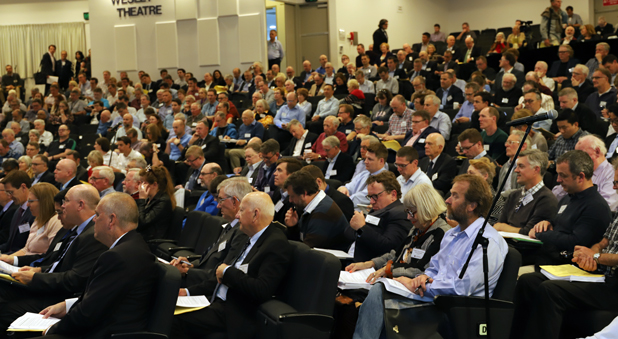
Dr Davies spoke of the need for more church planters and more rectors. "However, we should not be discouraged. It is easy to see all the problems without seeing the blessings of growth among us. We have this year a record number of six provisional parishes seeking full parish status. This is exciting, and I am so glad that it is our custom in Synod to celebrate these achievements of gospel growth. It is also heartening to see the regional missions taking place across the Diocese next year. A couple of years ago the Wollongong Region joined together in a regional mission under the banner of ‘Jesus is…’ with great success, under God. Next year the Wollongong Region is doing a reprise of this mission endeavour. The Georges River Region has already begun a year of prayer and preparation for a John 3:16 mission for 2020, with the hope that every member of every congregation will be able to recite John 3:16, and also commit to using it as a way of sharing the gospel with unbelievers. The Northern Region is similarly preparing for mission in 2020, as are the churches in the Hills in the Western Region, climaxing on Easter Day – the day of resurrection."
The Public Sphere
Dr Davies said the past year had seen significant developments in the life of our nation and our State, particularly in the areas of legislation relating to sex discrimination, religious discrimination and most notably, abortion. "If we are to be salt and light in our world, then we must not be silent on public issues where they concern the common good and the honour of Christ. While we shall, I fear, become increasingly subject to forces within our society that seek to marginalise not only the Christian voice, but all faith traditions, our engagement with these issues must not be based upon seeking to preserve ourselves or the privileged status we currently enjoy. Rather, our concern ought to be for the glory of God in following his paths. Since he has given us our charter for the care of God’s world and its inhabitants, this should be our prime concern. ‘Doing the good’, as the apostle Peter puts it, ought to be part and parcel of our Christian DNA. We are the true benefactors for the world. We not only have a gospel to proclaim, which will affect the destiny of every living person on the planet, including the unborn, but we have God’s charter for humanity, as Walter Kaiser describes Gabriel’s words to Daniel. God has told us what to do: He has showed you, O Man, what is good. And what does the Lord require of you but to act justly and to love mercy and to walk humbly with your God. (Micah 6:8) We know that God’s laws are good for humanity. We should never be ashamed of presenting God’s ways to our fellow Australians as that which will bring harmony and peace within the world. Of course, we shall be opposed, or perhaps worse, misunderstood, as the media so frequently portray our views.
Final Words
Although the Archbishop doesn't officially retire until next July, some months early to allow an election Synod next August, this will be his last Presidential Address to Synod. "It has been a distinct honour and privilege for me to serve in the office of Archbishop these past six years. As many of you will know, I did not seek this office, but found it thrust upon my shoulders by the will of the Synod, under the leading of the Holy Spirit ― and I take neither aspect for granted. It is an onerous office in many respects, but I have actually enjoyed serving the Diocese in this capacity. I have sought to discharge my office with integrity, transparency, courage and humility, conscious of the weight of responsibility, conscious my own inadequacies, yet also conscious of the grace of God and the abundance of prayers from so many people that have been offered to God on my behalf. I could not have administered this office in my own strength. Seven years ago, our diocese was polarised by the early announcement of two nominees for the office of Archbishop. This proved to be an unhealthy aspect of our diocesan life, regrettably fuelled by many unrestrained comments on social media. I believe we have matured as a Diocese and especially as a Synod through that experience. I do not detect the kind of angst that was apparent during the lead up to the next election, nor the similar expressions of anxiety and factional friction that the two previous elections exhibited. Rather, I do detect a growth in our love for one another. While it is proper for members to propose names for the Synod’s consideration, I am hopeful that more than two names will be proposed. More to the point, it is my prayer that Synod members will not come to the Election Synod with their minds made up, but carefully and prayerfully listen to the debate as part of their discernment of God’s will. Hopefully, some members will nominate more than one person. For the Synod does not vote on ‘candidates’ for this high office, but rather vote on ‘nominees’ for Archbishop. We should not wish for a person who ‘campaigns’ for office, nor should we want him to! Rather, making nominations is a way in which we bring names of qualified persons to the attention of the Synod for their consideration, as to whether they have the gifts to exercise an ‘evangelical archiepiscopate’. Those who have worked with them in the past or know them well, will inform the Synod at the proper time so that their gifts and skills, their character and convictions might enable the Synod prayerfully and wisely, under God’s leading, to elect the next Archbishop of Sydney. We have been blessed in the past with good and godly men who have been nominated for this high office. We should not take that for granted. Nor should we encamp ourselves in factional groupings seeking to dispel the strengths of alternative nominees. There is a number of people who are capable of becoming Archbishop, and we should thank God for the richness of his gifted servants he has given us. We should therefore pray that God will enable the Synod to make a wise and godly choice when the Synod meets next year."
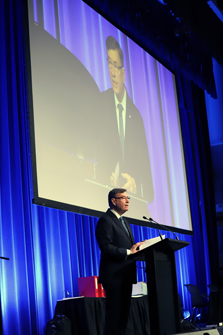 After thanking the Bishops, the Archdeacon for Women's ministry and his personal staff, Dr Davies thanked Mrs Davies. "Finally, my wife, Dianne, has been unfailing in her love and support of me, not only in this office, but also throughout our forty years of marriage. I thank God for her with all my heart."
After thanking the Bishops, the Archdeacon for Women's ministry and his personal staff, Dr Davies thanked Mrs Davies. "Finally, my wife, Dianne, has been unfailing in her love and support of me, not only in this office, but also throughout our forty years of marriage. I thank God for her with all my heart."
He concluded - "Now I commend you to the work of this session of Synod, and may the words of Paul to Titus steer our path, as we seek to do what is pleasing in God’s sight and will bring honour to his name.
For the grace of God has appeared that offers salvation to all people. It teaches us to say "No" to ungodliness and worldly passions, and to live self-controlled, upright and godly lives in this present age, while we wait for the blessed hope-the appearing of the glory of our great God and Saviour, Jesus Christ, who gave himself for us to redeem us from all wickedness and to purify for himself a people that are his very own, eager to do what is good. (Titus 2:11-14)"
At the end of the address, the Synod gave the Archbishop a standing ovation.
The full address is available here in PDF and in video. The Archbishop has also written an Opinion piece published by the Sydney Morning Herald.

